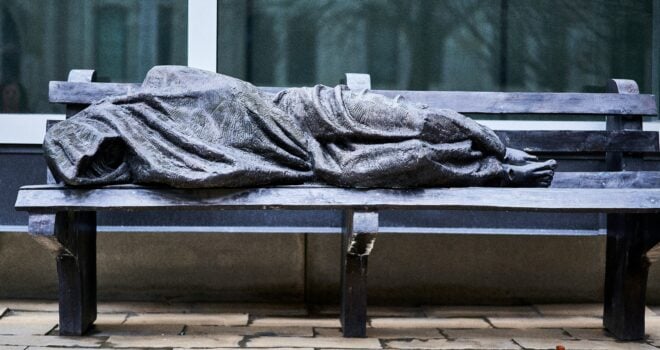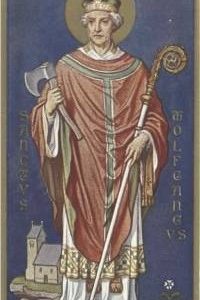Years ago, I was struck by the powerful witness of a Redemptorist priest celebrating Mass. He was new to our parish at the time. There had been a lot of tumult and division when the parish went through multiple pastors in a short period of time. A lot of bitterness and resentment had built up within the community. This priest had spent 30 years in the mission fields of Africa. He had known the deep agonies of people, unspeakable poverty, the horrors of war, and the loneliness of being the only priest in isolated bush country. The Lord used these experiences to rightly order his heart.
When the time came for him to distribute Holy Communion to the faithful, he did not begin by taking his place at the front of the nave. Instead, he silently walked around the nave providing Holy Communion to the sick, handicapped, and infirm. The rest of us, who were healthy and able to easily come forward, were asked to wait. The strong—the first in the world—were told to be last, and those who were sick—the last according to the world—were to be first.
This is how the Lord operates. This is how He sees his beloved people. It is the suffering, weak, broken, poor, and infirm who are meant to be first. How often we do not operate the way He does. We see this in last Sunday’s Gospel reading about Bartimaeus’ miraculous healing from blindness. We heard from Mark’s Gospel verses 10:46-49:
As Jesus was leaving Jericho with his disciples and a sizable crowd, Bartimaeus, a blind man, the son of Timaeus, sat by the roadside begging. On hearing that it was Jesus of Nazareth, he began to cry out and say, “Jesus, son of David, have pity on me.” And many rebuked him, telling him to be silent. But he kept calling out all the more, “Son of David, have pity on me.” Jesus stopped and said, “Call him.”
This man born blind was abandoned by the people around him. He would have been considered unclean due to his illness, which the Pharisees believed was a result of his sin. He was cut off from the worshipping community. He was reduced to the desperation of a beggar. The Lord sees Him, though. In fact, He uses Bartimaeus to reveal the hardness of heart in those following Him, including us today.
The crowd wanted to prevent Bartimaeus from going to Christ. He was embarrassing, burdensome, and unwanted by them. The Lord knew that the people who were present needed a lesson in charity. To have their stony hearts turned to hearts of flesh. The Lord prefers to use weakness and suffering to confound the strong in their pride. He calls Bartimaeus out of his misery to healing and freedom. The crowd is taught that Bartimaeus deserves to be first because of his affliction, not relegated to the very back because he is weak.
In this passage, and many others, the Lord shows His followers who matters most within the community. It is not the wealthy, powerful, healthy people who have everything together. He came to save sinners, not the righteous (Luke 5:31-32). He is moved with compassion for the sick and the suffering. He wants to draw them to Himself and into the worshipping community. He calls us to do the same.
Unfortunately, within our churches, we tend to forget who should come first. We form our cliques, power players, wealthy donors, and the popular through ministries. We have our plans for the parish that much too often are inwardly focused on providing for the strong and healthy of the community while the suffering are an afterthought. Our Holy Communion lines are treated like a drive thru where our focus is on speed, efficiency, and expediency rather than encounter and nourishment from Christ, especially for the crucified among us.
The Redemptorist priest who made the rest of us wait to receive Holy Communion while He ministered to the sick and infirm was acting as Christ would. The Lord wants to go to those who are closest to Him on the Cross in that moment. He wants to confound the hard-hearted of the community that view these people as a burden or an after-thought.
One of the greatest tragedies of the Church today is a growing hard-heartedness caused by focusing on liability. The ever-growing bureaucracy, legal teams, and marketing strategies are leading to a turning away from placing charity above all else. We no longer see the suffering among us as an opportunity to experience Christ’s love from the Cross. We do not understand that our first responsibility is to the suffering and the lost. Instead, we abandon people in their need because of fear of lawsuits and loss of revenue. The Lord will judge us harshly for our hardness of heart, and we will deserve it. We have become like the crowds who tried to shut out the afflicted calling to the Lord throughout the Gospels.
The broken members of Christ’s body and the lost souls in the culture are not our responsibility after we have built our churches to our liking, and after the strong and healthy have their pride of place. The suffering must come first. They should be on our minds and in our hearts with every decision that we make. The worshipping community should be all too happy to wait and watch in reverent joy as the Lord ministers to the sick and the suffering present at Mass through being given priority in receiving Holy Communion.
Every effort should be made to get the homebound to Mass. Parishes should be evangelizing and ministering in hospitals—not blindly handing out Holy Communion as if Our Lord’s Real Presence is simply meaningless candy for those who are far from the Lord because it requires no effort. We should be finding ways to reach the poor who darken our doors even if they are odd and different from us. We should be seeking them in our cities and towns rather than viewing them with indifference, fear, or repugnance. These are the very souls the Lord is calling us to bring to Him.
St. Teresa of Calcutta saw with the eyes of Christ in her service to the poor, sick, and suffering: “What is my thought? I see Jesus in every human being. I say to myself, ‘This is hungry Jesus, I must feed him. This is sick Jesus. This one has leprosy or gangrene; I must wash him and tend to him.’ I serve because I love Jesus.” Do we see Jesus in our suffering brothers and sisters in our parishes and in our communities? Do we understand that in Christ’s kingdom they come first?
There is a distressing tendency to treat the suffering as a burden. This happens when we reduce people to a number, which is a growing problem in many dioceses. This coincides with a disordered focus on liability, money, and worldly security of the Church’s treasure. The truth of the matters is that if we lost all our worldly power and money and had to return to the catacombs, we would still have everything because we would have the pearl of great price: Jesus. The most beautiful church in the world is meaningless if we lack love. We live either unconsciously or consciously in a hard-hearted manner every time we place the strong ahead of the weak. All worldly esteem and power is nothing if it hardens our hearts and turns us away from the suffering in our midst.
The suffering members of our parishes and local communities should be treated with great love, reverence, and dignity. St. Vincent de Paul said: “We should strive to keep our hearts open to the sufferings and wretchedness of other people, and pray continually that God may grant us that spirit of compassion which is truly the spirit of God.” This means we must be a people of the Cross. We cannot flee because it is difficult or because, in our fallen state, we find suffering and weakness repugnant or fearsome. It is these very people the Lord wants to use to help turn our hearts of stone to hearts of flesh.
The Redemptorist priest died 1.5 years after coming to the parish. He was diagnosed with lung cancer that spread to his brain. He died as he lived. My husband and I were at the last confessions he ever heard on Divine Mercy Sunday in 2016. He died one week later in the arms of Our Blessed Mother. That Divine Mercy Saturday evening, he walked in full of joy. He joked with all of us in line for confession. No one knew he was about to die. He died a faithful minister of the Church who saw with the eyes of Christ.
Who is placed first in our churches? Is it the weak, suffering, infirm, broken, and the poor, or is it the strong, healthy, powerful, rich, and popular? This order tells us everything we need to know about our priorities and the spiritual state of our parishes. If it is our plans, activities, ministries, or expedience that rules the day, then our hearts have hardened in some way. If, instead, we seek out the suffering and offer them pride of place, we will see our hearts and our churches transformed by the healing light of Christ. We will see as He sees.
Photo by Ashwini Chaudhary(Monty) on Unsplash












